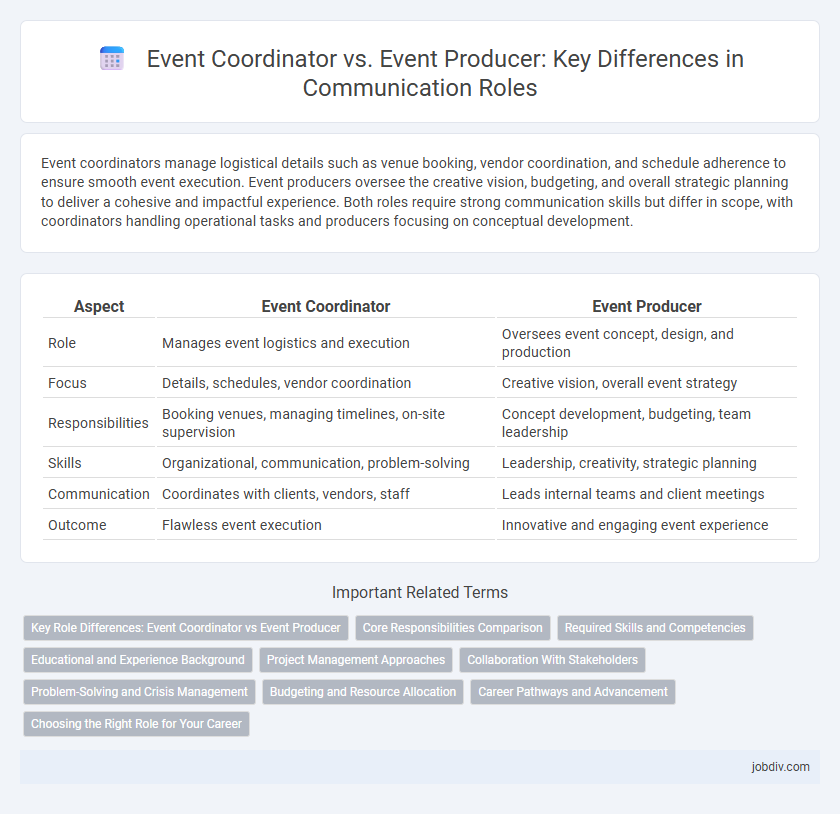Event coordinators manage logistical details such as venue booking, vendor coordination, and schedule adherence to ensure smooth event execution. Event producers oversee the creative vision, budgeting, and overall strategic planning to deliver a cohesive and impactful experience. Both roles require strong communication skills but differ in scope, with coordinators handling operational tasks and producers focusing on conceptual development.
Table of Comparison
| Aspect | Event Coordinator | Event Producer |
|---|---|---|
| Role | Manages event logistics and execution | Oversees event concept, design, and production |
| Focus | Details, schedules, vendor coordination | Creative vision, overall event strategy |
| Responsibilities | Booking venues, managing timelines, on-site supervision | Concept development, budgeting, team leadership |
| Skills | Organizational, communication, problem-solving | Leadership, creativity, strategic planning |
| Communication | Coordinates with clients, vendors, staff | Leads internal teams and client meetings |
| Outcome | Flawless event execution | Innovative and engaging event experience |
Key Role Differences: Event Coordinator vs Event Producer
Event Coordinators primarily manage logistical details such as scheduling, vendor communication, and on-site execution to ensure smooth event operations. Event Producers oversee the creative vision, budget planning, and overall event strategy, shaping the attendee experience from concept to completion. The key distinction lies in the Coordinator's operational focus versus the Producer's strategic and creative leadership.
Core Responsibilities Comparison
Event Coordinators primarily manage logistical details such as venue booking, vendor coordination, and schedule adherence, ensuring the event runs smoothly. Event Producers focus on the creative vision, overseeing content development, production design, and overall experience to align with client goals. Both roles require strong communication skills but differ in scope, with coordinators emphasizing operational execution and producers driving strategic planning and creative direction.
Required Skills and Competencies
Event Coordinators require strong organizational skills, attention to detail, and effective communication to manage logistics and vendor relationships efficiently. Event Producers possess advanced project management abilities, creative problem-solving skills, and leadership competencies to oversee event conceptualization and execution at a strategic level. Both roles demand proficiency in budgeting, time management, and client interaction to ensure successful event outcomes.
Educational and Experience Background
Event Coordinators typically hold a degree in hospitality, communications, or marketing, with 1 to 3 years of hands-on experience in logistical planning and vendor management. Event Producers often possess advanced education in event management, business administration, or entertainment production, backed by 3 to 5 years of expertise in creative direction and large-scale event execution. The distinction lies in their educational depth and practical exposure, where coordinators focus on operational details and producers emphasize strategic vision and content creation.
Project Management Approaches
Event Coordinators typically follow a linear project management approach, emphasizing detailed scheduling, vendor coordination, and on-the-ground logistics to ensure smooth event execution. Event Producers adopt a more strategic and adaptive project management style, focusing on creative vision, stakeholder collaboration, and overall event concept development. Both roles require strong organizational and communication skills but differ in scope, with Event Producers managing broader project phases and Event Coordinators handling operational details.
Collaboration With Stakeholders
Event Coordinators facilitate seamless communication with clients, vendors, and venue staff to ensure timely execution and alignment with event objectives. Event Producers engage stakeholders at a strategic level, shaping event concepts and managing creative direction to meet brand goals and audience expectations. Both roles require strong interpersonal skills and collaborative problem-solving to achieve successful event outcomes.
Problem-Solving and Crisis Management
Event Coordinators specialize in logistical problem-solving, ensuring smooth execution by addressing scheduling conflicts and vendor issues with precision. Event Producers handle high-level crisis management, developing strategic contingency plans to mitigate risks that could disrupt overall event goals. Both roles require adept communication skills to swiftly resolve challenges, but Producers focus more on overarching problem identification and resolution strategies.
Budgeting and Resource Allocation
Event Coordinators focus on managing budgets by tracking expenses and allocating resources to ensure event components stay within financial limits. Event Producers take a strategic approach to budgeting, overseeing resource allocation to maximize overall event impact and profit potential. Efficient budget management by both roles is crucial for successful event execution and financial control.
Career Pathways and Advancement
Event coordinators typically begin their careers managing logistics and vendor relationships, gaining hands-on experience in event execution. Event producers advance by overseeing the entire event lifecycle, including creative direction and strategic planning, which demands higher leadership skills and broader industry knowledge. Career pathways often see coordinators progressing to producer roles, with growth opportunities expanding into senior management or specialized event strategy positions.
Choosing the Right Role for Your Career
Event coordinators manage logistical details such as venue booking, vendor communication, and on-site event execution, making them ideal for professionals who excel in organization and hands-on management. Event producers focus on the creative vision, budgeting, and overall event concept development, suited for those with strong leadership skills and a flair for innovation. Choosing the right role depends on whether you prefer operational tasks or strategic planning within the event management industry.
Event Coordinator vs Event Producer Infographic

 jobdiv.com
jobdiv.com